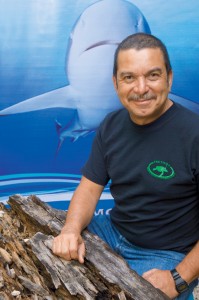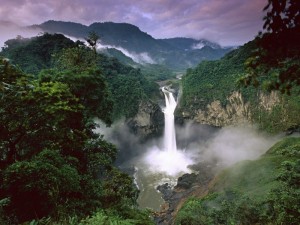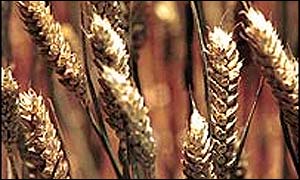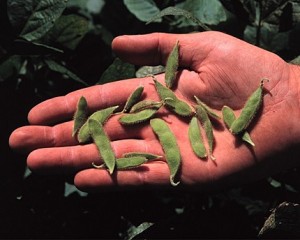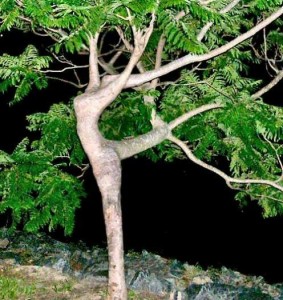1. Goldman Prizes for Cuba and Costa Rica
2. Yasuní Reserve Declaration
3. Syngenta + CIMMYT = GM Wheat
4. “Responsible” Soy in trouble
5. The WWF and Tree Monoculture Plantations
1. Goldman Prizes for Cuba and Costa Rica
Activists from Cuba and Costa Rica are among the winners of the 2010 Goldman Prize, delivered on Apr. 22, Earth Day.
The Cuban scientist and musician Humberto Ríos won the award for his work with farmers to increase crop diversity and develop low-input agricultural systems, encouraging a shift in Cuba from an agricultural chemical dependence toward sustainability.
“Today, more than 50,000 farmers participate in seed biodiversity initiatives and carryout the farming practices promoted by Ríos and the national network of universities and researchers supporting agrobiodiversity”, states a Goldman Prize media release.
“As coordinator of the National Institute of Agricultural Sciences’ Program for Local Agricultural Innovation (PIAL), Ríos now focuses his time on developing Cuba’s sustainable agriculture sector and has engaged in similar farmer-led biodiversity projects throughout Mexico. He often uses his music as a means to engage communities in biodiversity, performing songs that celebrate sustainable agriculture”.
Costa Rican Randall Arauz received the award for his activism against the sale of shark fins, an ecologically disastrous practice. “Arauz has represented Costa Rica at several U.N. meetings and has called for a complete ban on shark finning. In 2007, he participated in a U.N. Convention of Migratory Species meeting as an official Costa Rican delegate and was instrumental in the election of Costa Rica as a member of a five-country commission tasked with drafting language for international cooperation for the protection of sharks”.
Sources:
Humberto Ríos Profile http://www.goldmanprize.org/2010/islands
Randall Arauz Profile http://www.goldmanprize.org/2010/southcentralamerica
2. Yasuní Reserve Declaration
Rainforest Rescue is seeking for support for a declaration to be sent to European governments requesting their support for the Yasuní Initiative, a proposal under which the government of Ecuador promises not to permit petroleum extraction in the Yasuní nature reserve in exchange for economic compensation.
“The ‘Yasuni’ is one of the most biologically diverse places on earth and has world record number of species of amphibians, reptiles, bats and, above all, trees”, states Rainforest Rescue, whose headquarters are in Germany. “The park gives shelter to a large number of threatened species that are native to the region. This earthly paradise is also home to indigenous people such as the Huaorani as well as the Tagaeri and Taromenane who live in voluntary isolation”.
“The suggestion to leave Yasuni’s oil underground was first voiced a few years ago by groups within civil society and was taken up by President Rafael Correa as soon as he began his term of office. The initiative calls has profound implications for the rest of the world as it calls on all of the world’s inhabitants to build alternative ways of living. These involve making economic sacrifices out of respect to the indigenous people who are living in voluntary isolation in Yasuní, and to protect an area of unparalleled biodiversity which is invaluable to all of humanity”.
“The implementation of this initiative would mean that one fifth of Ecuador’s oil reserves would remain untouched. The Ecuadorean government is therefore looking for compensation worth $4 billion, to be paid out over 12 years. This money would be used for social development projects and to finance Ecuador’s transition to supplying renewable and clean energy. The Ecuadorian government would be prepared to meet most of the costs of not extracting these oil reserves because of the benefits derived from avoiding the high environmental and social costs which such a development would bring with it”.
The declaration clarifies that the proposal is payment for historic ecological and social debts between developed countries and poor countries. Therefore, it should not be part of the lucrative Clean Development Mechanism (carbon credits) of the Kyoto Protocol, nor should it generate additional external debt, become debt-for-nature swap, or be conditioned on a free trade agreement. “Those who support the Yasuní initiative will truly become precursors of the new post-oil civilization”, says the declaration.
“We appeal to European governments, led by Germany, Spain and Belgium who have already shown their sympathy towards this initiative, to contribute politically and economically to this impressive initiative which is now under threat”.
Source:
Rainforest Rescue, “Manifest to sign on: Moving towards a low carbon, energy supply solution”
http://www.rainforest-rescue.org/protestaktion.php?id=556
3. Syngenta + CIMMYT = GM Wheat
The European biotechnology firm Syngenta and the International Center of Research for the Improvement of Corn and Wheat (CIMMYT) announced on April 6 that they will join forces to develop varieties of wheat, both conventional and GM. Syngenta, formed in 2000 with the merger of the agricultural divisions of Novartis and AstraZeneca, is the second largest pesticide company in the world and ranks third in the global seed market (topped only by the American firms Monsanto and Dupont).
CIMMYT, located in Mexico and founded by the Mexican government and the Rockefeller Foundation in 1943, a public sector international agricultural research center that played a very important role in the so-called “green revolution”, the name given to the export of the American model of industrial monoculture to poor developing countries promoted by, among others, the World Bank, the Rockefeller Foundation, the government of the US, and the UN.
“Wheat is a key crop for Syngenta; this partnership will strengthen the company’s global presence and reinforce its position as a leader in the worldwide commercial wheat seeds market”, declares Syngenta in a media release. “This market is expected to increase in value as new technologies are introduced. For CIMMYT, the partnership will strengthen its ability to use world wheat genetic resources and cutting-edge technologies to develop robust wheat varieties for disadvantaged farmers in developing countries and public research systems worldwide”.
Syngenta was the object of harsh international criticism after guards from a private firm that it contracted shot into a camp of the Landless Movement of Brazil, wounding several occupants and killing one. The camp, located in the Brazilian state of Paraná, was on a farm where Syngenta had been illegally growing GM wheat.
CIMMYT, for its part, has been questioned by sectors of civil society for its apparent indifference to the contamination of traditional Mexican corn with GM varieties. CIMMYT does not oppose GM crops. In fact, along with Monsanto and the Bill and Melinda Gates Foundation, it is developing GM corn varieties resistant to drought for use in Africa – Project WEMA (Water-Efficient Maize for Africa).
Source:
Syngenta. “Syngenta and CIMMYT establish industry-leading partnership to advance wheat research” http://www2.syngenta.com/en/media/mediareleases/en_100406.html
4. “Responsible” Soy in trouble
The Round Table on Responsible Soy (RTRS), an agro-industry initiative to legitimize soy monocultures in South America, is on shaky ground now that one of its key members has withdrawn and the Dutch government is reconsidering its support. The Round Table is a working group that brings together businesses and civil society groups in order to formulate criteria for environmentally sustainable and socially responsible soy production in order to achieve its acceptance in European markets. Its members include Syngenta and the World Wildlife Fund (WWF).
But numerous sectors of civil society and NGOs have condemned this initiative since its inception. In April 2009, 90 organizations and activist networks signed a protest letter against the RTRS in which they declared emphatically that soy monocultures can never be sustainable or responsible.
ABIOVE, the Brazilian Vegetable Oil Industry Association, withdrew from the Round Table at the beginning of April. A short time later it announced the creation of its own certification scheme, called Soja Plus, which is supposedly even more favorable to industry.
Last year APROSOJA, the association of large soy producers of Brazil, withdrew due to disagreement with the Round Table’s deforestation clause. As a result, the Round Table has practically no representation in Brazil, the main soy exporting-country in the world.
The Corporate Europe Observatory (CEO) reports that the Round Table received another very hard blow in April when the Dutch government decided not to invest 68 million Euros in a “sustainable business” proposal that included the RTRS.
In the meantime, one of the members of the Round Table, the Argentinean agrofuel company Patagonia Bioenergy, hired the public relations firm Burson Marsteller to exert influence on the European Union so that its sustainability criteria will be more favorable to agrofuels. Burson Marsteller represented the military dictatorship that governed Argentina during the 1970s and 1980s.
Source:
Corporate Europe Observatory. “Round Table on Responsible Soy Suffers Setbacks” April 8, 2010. http://www.corporateeurope.org/agribusiness/blog/nina/2010/04/08/setbacks-round-table-responsible-soy
5. The WWF and Tree Monoculture Plantations
The World Wildlife Fund (WWF), in addition to being the object of harsh criticism for its membership in the Round Table on Responsible Soy, is also under fire for giving its seal of approval to a United Nations’ Food and Agriculture Organization’s (FAO) tree monoculture plantation certification scheme, which the World Rainforest Movement (WRM) considers fraudulent.
The WWF currently directs and coordinates a “New Generation Plantations Project” with the participation of tree plantation firms such as Forestal Oriental, a subsidiary of Finland’s UPM/Kymmene operating in Uruguay; Portucel, which has operations in Uruguay; Smurfit Kappa Cartón, an Irish-Dutch company operating in Colombia; and the Swedish-Finnish Stora-Enso, whose operations in Brazil and Uruguay are the object of controversy.
“Around the world, millions of hectares of productive land are quickly being converted to green deserts disguised as ‘forests’”, declared the Latin American Network Against Tree Monocultures in August 2009. “Local communities are displaced in order to make room for unending rows of identical trees – eucalyptus, pine, oil palm, rubber trees, jatropha (physic nut), and other species – which replace nearly all other forms of life in the zone. Cultivable land, crucial for the food sovereignty of local communities, is converted into monoculture tree plantations producing raw materials for export. Water resources are contaminated and exhausted by the plantations, while the earth is degraded”.
“What WWF is actually doing is to promote the expansion of tree monocultures and helping to greenwash the long – and well documented – history of past and present destructive activities of the companies and organizations involved in this project,” denounces the WRM. “At the same time, it is assisting the beleaguered FAO by continuing to define tree plantations as “planted forests”, thereby weakening the growing civil society demand for changing a definition that has so much served plantation companies for obscuring the true and negative nature of these monocultures.”
Source:
World Rainforest Movement, Bulletin 153, April 2010. “FAO and WWF: birds of a feather promote ‘planted forest’ together” http://www.wrm.org.uy/index.html
Latin American Network Against Tree Monoculture, “Declaración de la Red Latinoamericana contra los Monocultivos de Árboles”, August 1, 2009
http://www.wrm.org.uy/plantaciones/RECOMA/declaracion_08_09.html
Carmelo Ruiz Marrero is an independent environmental journalist and environmental analyst for the Americas Program (www.americasprogram.org), a fellow at the Oakland Institute, senior fellow at the Environmental Leadership Program, as well as founder and director of the Biosafety Project of Puerto Rico (bioseguridad.blogspot.com). His bilingual web page (carmeloruiz.blogspot.com) is devoted to global environmental and development issues.
Translated by Erin Jonasson
For more information:
Americas Program Biodiversity Report—April 2010
https://www.americas.org/archives/2080
Americas Program Biodiversity Report—March 2010
http://americas.irc-online.org/am/6706
Americas Program Biodiversity Report—February 2010
http://americas.irc-online.org/am/6689

